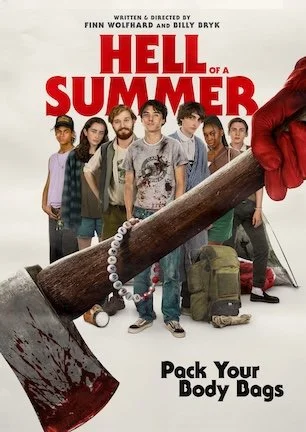Studio: Vertical Entertainment
Director: Babak Anvari
Writer: Babak Anvari
Producer: Lucan Toh, Oliver Roskill, Emily Leo
Stars: Narges Rashidi, Avin Manshadi, Bobby Naderi, Arash Marandi, Aram Ghasemy, Soussan Farrokhnia, Behi Djanati Atai, Ray Haratian, Hamidreza Djavdan, Bijan Daneshmand
Review Score:
Summary:
A mother and daughter confront supernatural terror inside a war-torn Tehran, Iran apartment building.
Review:
Shideh’s medical school dreams have just been dashed by the youthful indiscretions of her revolutionary past. Her husband Iraj’s idea of comfort is to suggest they are better off with him being the only doctor in the family. Shideh would prefer to take Iraj to task for his lack of progressive thinking, even if it is 1980s Iran. That debate swiftly swims to a back burner once Iraj is drafted into a military tour of duty, leaving Shideh on her own with their young daughter Dorsa.
While the horror of the Iran-Iraq War summons sirens and fire strikes outside, another type of terror takes a different toll inside a war-torn Tehran apartment building. After an unexploded missile rocks the residence, Shideh and Dorsa’s daily drills of sheltering with neighbors during air raids are suddenly supplanted by the sinister air of something supernatural haunting mother and child.
Dorsa repeats disturbing legends of demonic djinn told to her by a mute boy living downstairs. Personal items like Dorsa’s beloved doll and Shideh’s contraband Jane Fonda workout tape disappear without explanation. Shideh would rather join the steady stream of residents fleeing the building for safer quarters, but an intangible presence is not so eager to see her go. Shideh unavoidably finds herself fighting for psychological survival as much as for physical when she becomes the only wedge shielding Dorsa from this evil entity. But Shideh may be no help to anyone if she can’t stop her mind from unraveling first.
Fairly and unfairly, Farsi-language festival favorite “Under the Shadow” is repeatedly described as an Iranian “The Babadook.” Unfairly, because “Under the Shadow” is its own entity with a highly original setting and an exceptional cinematic sensibility for weaving supernatural suspense. Fairly, because the simple comparison nevertheless accurately summarizes the film’s central focus on an oppressive parental nightmare.
However apt the simile, the fact of the matter is it makes for a safe estimation to surmise that those unsatisfied by the psychological story and cerebral ambiguity of “The Babadook” are unlikely to find favor with “Under the Shadow” for similar reasons. “Under the Shadow” is very much a multilayered exploration of atmosphere thick with themes of struggling for personal identity, empowerment, and adapting to grief.
Anyone out to experience “Under the Shadow” as a slow-build haunter instead of a socially-charged thinkpiece is still in luck. Director Babak Anvari slides in subtext so subtly that it complements creeping chills with unobtrusively politicized parallels rather than overpowering the family fear narrative running through the core. That absence of a heavy hand frees viewers to connect with characters and content on whatever levels they wish. “Under the Shadow” is equally adept at moving a hand over the mouth in fright or guiding it to the chin for a stroke of contemplative reflection.
Differentiating “Under the Shadow” above all else is its fascinating backdrop of Middle East turmoil. Whether the threat comes from an unexpected bombing, a nosy neighbor reporting VCR ownership to authorities, or a run-in with police for neglecting to wear a headdress in public, culture-specific danger threatens Shideh from all angles before paranormal paranoia even emerges from the hole in her ceiling. Anvari masterfully maneuvers each degree of dread to create a relatable sense of societal sadness and inescapable evil continuously closing like a vice grip.
Despite the elevation of its outstanding setting, provocative plotting, and Roman Polanski influences making for an unnerving mood, it is difficult to fully separate “Under the Shadow” from Jennifer Kent’s 2014 horror hit “The Babadook” (review here). Were the feeling inspired not so similar, “Under the Shadow” would stand taller as a fiercer force of horror filmmaking.
A number of “The Babadook” criticisms come from viewers and reviewers irritated by Noah Wiseman’s unruly little boy character, Samuel. I feel completely differently, citing Wiseman’s performance as one of the most terrifically memorable ones ever delivered by a child actor. However, irritated is how I feel about Avin Manshadi as Dorsa in “Under the Shadow.”
Fault is not in the young actress’ portrayal. Rather, it is in distaste for the character’s particular brand of pouty disobedience. Whereas Sam’s overactive misbehavior is ringed with sincere affection for defending his mother from imaginary monsters, Dorsa is a boring brat. Sam’s charm counterbalances obnoxiousness. Dorsa’s function is facilitating her mother’s frustration and underwriting her character like this undermines an ability to connect with the mother-daughter plight of “Under the Shadow” in the same manner as mother-son in “The Babadook.”
Both films are remarkable achievements in genre cinema for technical execution, entertainment value, and emotional heft. But the relationship with more resonance ultimately determines any personal preference for one film over the other, as well as how lasting of an impression is left. “Under the Shadow” could have an even greater impact. Dorsa and Mister Babadook simply won’t allow it.
Review Score: 75







There's nothing intriguing about watching Eric track down and slaughter stuntmen instead of exacting a deserving vendetta against distinct villains.